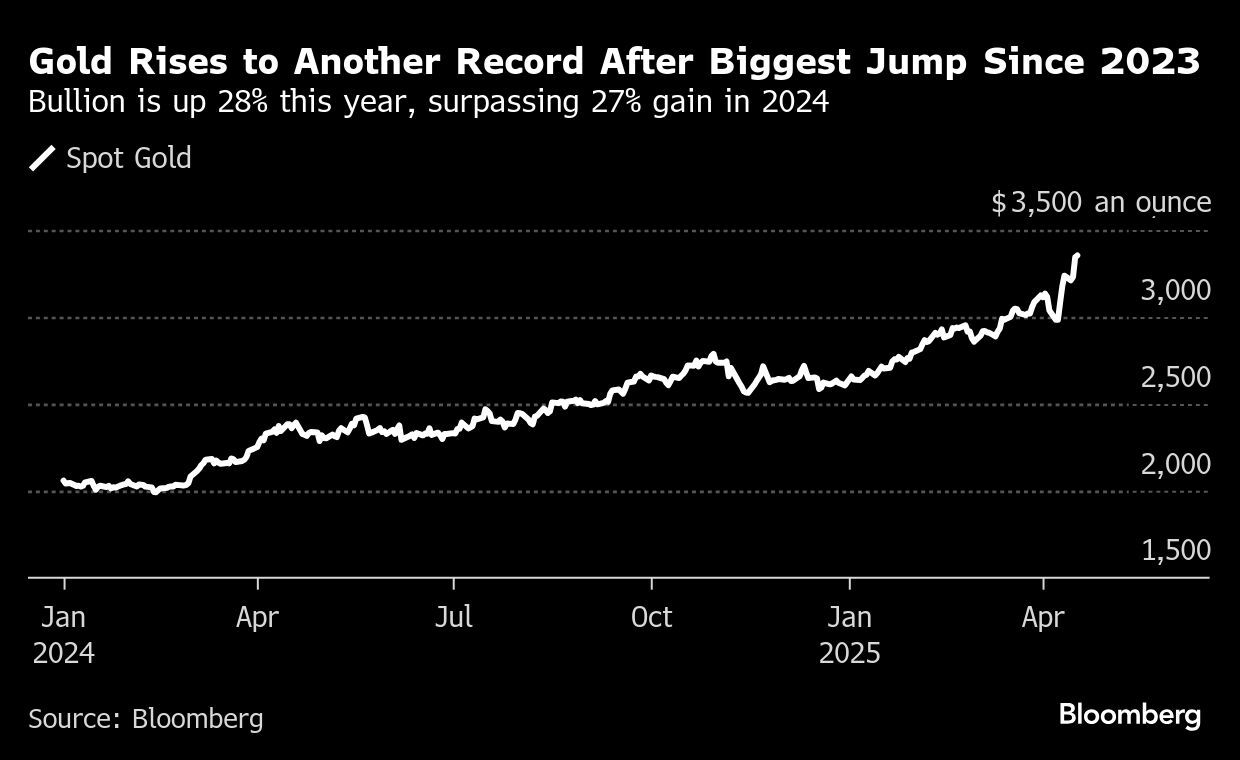
US stocks churned as traders poured through the latest batch of earnings reports while trying to gauge the impact of President Donald Trump's tariff offensive and invectives directed at the head of the central bank.
The S&P 500 eked out a small gain in choppy trading, with a slump in health insurers weighing on the equities benchmark after UnitedHealth Group Inc. cut its earnings outlook for the year. Shares of Alphabet Inc. fell after a federal judge found Google was illegally monopolizing some online advertising technology markets. The Nasdaq 100 wavered between gains and losses while the blue-chip Dow Jones Industrial Average tumbled 1.3%.
In the bond market, yields on Treasuries climbed after a $25 billion auction of five-year Treasury inflation-protected securities.
Trump said the termination of Federal Reserve Chair Jerome Powell from his position can't come quickly enough, arguing that the US central bank should have lowered interest rates already this year, and in any case should do so now.
To Krishna Guha at Evercore ISI the independence of the Fed will be a sticking point in the days ahead as tariffs bleed through to inflation expectations.
“Continued confidence in the Fed amid a loss of confidence in the administration has shaped the market response to date: real rates / real term premia higher, dollar lower, less US exceptionalism in equity markets – but well-behaved inflation expectations and no stagflation panic,” the former executive at the New York Fed wrote in a note to clients.
Applications for US unemployment benefits fell to the lowest level in two months, signaling a stable labor market. Meanwhile, the Philadelphia Fed Index tumbled, trailing all economists estimates, a warning shot from the manufacturing sector. A gauge of the dollar was little changed.
Following the turmoil triggered by the announcement of broad US levies earlier this month, investors are focusing more on developments in country-specific trade negotiations. Key questions surround China, after Beijing indicated Wednesday it has several conditions for agreeing to talks with the Trump administration.
The ECB lowered interest rates for the seventh time since last June as global trade tensions threaten to derail the region's economic recovery. The deposit rate was decreased by a quarter-point to 2.25%, as predicted by almost all analysts polled by Bloomberg. European stocks weakened.
On Wednesday, Powell indicated he was taking a wait-and-see approach on tariffs, pushing back on hopes the central bank would act quickly to soothe investor fears. His comments, along with concerns over the impact of levies on the tech sector, helped end a two-day consolidation in stocks.
“The only ‘Fed put' that the Fed could envisage is if there was a risk of market dislocation, which is not the case at the moment,” said Enguerrand Artaz, a fund manager at La Financière de l'Echiquier. “When you look at the data, there is no need to intervene. Markets going down is not a reason in itself to intervene, especially not at these levels of valuation.”
In earnings news, UnitedHealth Group Inc. plunged after the company cut its earnings outlook for the year and reported first-quarter earnings below estimates. Shares in other health insurers tumbled.
TSMC's US-listed shares rose after the main chipmaker for Nvidia Corp. and Apple Inc. forecast sales for the second quarter that beat analyst estimates.
Elsewhere, Eli Lilly & Co. soared on positive data from a weight-loss pill study.
On the trade front, the US and Japan kicked off negotiations with an aim to reach a deal as soon as possible, top Japan negotiator Ryosei Akazawa said. Preparations are underway for a second round of discussions later this month, he said.
Countries are racing to negotiate deals with the US to avert high import taxes Trump imposed — and then quickly paused — on about 60 trading partners. That move put a 24% across-the-board tariff on Japanese imports on hold, though a 10% baseline charge still applies — as well as 25% levies on cars, steel and aluminum.
“The trajectory of US-Japan trade talks will continue to be closely monitored, not just for their bilateral implications, but also as a potential framework for how the US may approach trade relationships with other allies,” said Rajeev De Mello, a global macro portfolio manager at Gama Asset Management.
In commodities, gold hit a record earlier Thursday on demand for havens, before turning lower as risk sentiment improved. Oil rose for a second day after the US vowed to reduce Iran's energy exports to zero.

Some of the main moves in markets:
Stocks
The S&P 500 rose 0.2% as of 11:44 a.m. New York time
The Nasdaq 100 was little changed
The Dow Jones Industrial Average fell 1.3%
The Stoxx Europe 600 fell 0.1%
The MSCI World Index rose 0.3%
Currencies
The Bloomberg Dollar Spot Index was little changed
The euro fell 0.3% to $1.1369
The British pound was little changed at $1.3253
The Japanese yen fell 0.3% to 142.25 per dollar
Cryptocurrencies
Bitcoin rose 0.3% to $84,592.37
Ether rose 0.5% to $1,582.2
Bonds
The yield on 10-year Treasuries advanced five basis points to 4.32%
Germany's 10-year yield declined four basis points to 2.47%
Britain's 10-year yield declined three basis points to 4.57%
Commodities
West Texas Intermediate crude rose 3% to $64.33 a barrel
Spot gold fell 1.4% to $3,297.40 an ounce
Essential Business Intelligence, Continuous LIVE TV, Sharp Market Insights, Practical Personal Finance Advice and Latest Stories — On NDTV Profit.























